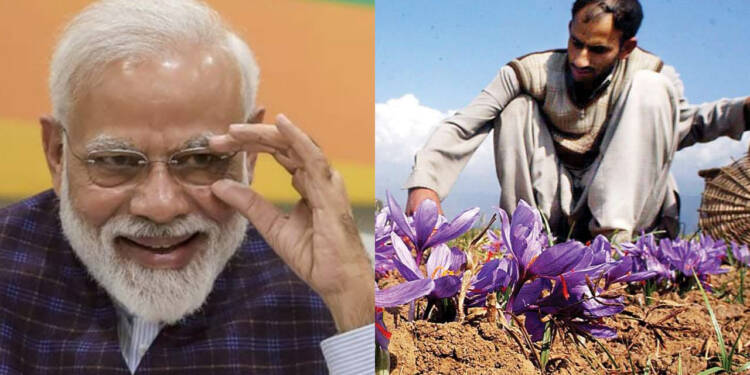The Modi government’s bold move to liberate the erstwhile state of Jammu and Kashmir from Article 370 by revoking its special status in August 2019 and bifurcating it into two union territories – J&K and Ladakh continue to bear fruits. In the latest news, Kashmir’s saffron has been freed from ‘terrorist tax’, a common term used for referring to the share of ‘taxes’ that had to be paid to terrorist and separatist organisations who, since the ’80s, had a firm and hegemonic hold over the trade of saffron in the valley. By breaking the backbone of terror organisations and separatist elements, the sale and purchase of Kashmiri saffron is now being seamlessly conducted.
Not only is saffron now easily accessible for national consumption, but is also being purchased by traders for global sale without much hassle. Before the revocation of Kashmir’s special status, any trader needed to pay up large sums of money to terror organisations, which had led to tremendous cost escalation of Kashmiri saffron. However, as of December 2020, Kashmiri saffron was being sold on the retail market at approximately Rs.90,000/- kg. According to a report by Live Hindustan, for the first time, traders from Kanpur and Delhi have been able to purchase saffron directly from the Kashmiri farmers.
Read more: Kashmir no longer an Apartheid Warzone – Thanks to Indian Government
Before the repeal of Article 370, Kashmiri saffron being sold at a value of anywhere between Rs. 1,50,000 – Rs. 2,50,000/- kg was considered normal. With prices now dropping to as low as Rs. 90,000 per kilogram, one can gauge the amount of money which had to be fed to terror organisation only to purchase the world-renowned commodity. Also, before the revocation of Kashmir’s special status, terror organisations strictly regulated the trade of saffron, prohibiting non-Kashmiri traders from purchasing it from the valley. Now, however, any trader can directly purchase saffron from the farmers of the valley.
Read more: Any Indian can now buy land in Jammu and Kashmir as Modi govt makes a landmark decision
Kashmir is cultivated in mainly four districts of Kashmir – Pulwama, Budgam, Srinagar and Kishtwar. Incidentally, these are also terror hotbeds of the region, which made the trade of saffron particularly difficult. Close to 35,000 Kashmiris are involved in the cultivation of saffron.
In July last year, the Modi government had also granted Kashmiri saffron the geographical indication (GI) tag, which put the valley’s produce on the global map. A geographical indication (GI) is a sign used on products that have a specific geographical origin and possess qualities or a reputation that are due to that specific origin.
Apart from a massive developmental and infrastructural push and in general making the people of Kashmir feel less threatened by the menace of Islamist terror, the Modi government is also ensuring that an independent economy is created in the union territory which will tremendously benefit it.

























